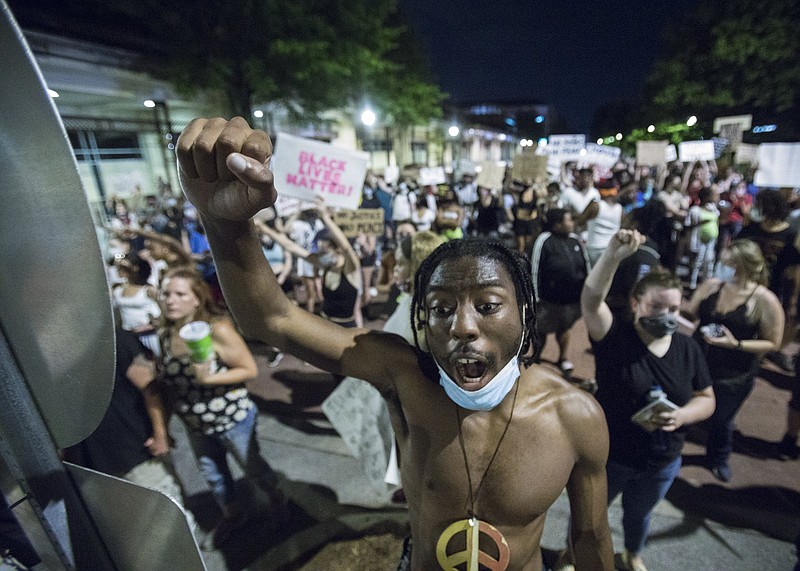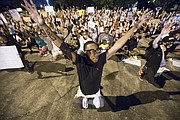Hundreds of Chattanoogans have taken to the streets every night for a week to protest police brutality and demand local criminal justice reform following the death of George Floyd under the knee of a Minneapolis police officer last month.
While many protesters have used the outlet to vent general frustrations with law enforcement, organizer Cameron C-Grimey Williams told the group on Tuesday that the events were about more than grieving Floyd. They were about demanding tangible changes to local law enforcement, prisons and governance.
"We're not just here because we're frustrated and angry. We're here because we have demands for real change," Williams said. "Our demands are simple and can be met if our government and our people decide to work together."
The demands were distilled on Saturday to one list shared with the Times Free Press by #ICantBreatheCHA, Concerned Citizens for Justice, The Unity Group, the African American Women's Coalition and the Community Haven Chattanooga.
"The following information is an attempt to speak to the prejudiced nature of some police officers in the Chattanooga Police Department. These prejudices cause a different treatment of people of color who interact with one or more police officers," the groups wrote.
"The young citizens, with support of the more seasoned citizens, call on the mayor, City Council and police chief to do the following and give the citizens and/or representatives the opportunity to give input to the process of policy review as that review falls within the city purview."
(READ MORE: Black elected officials call for protesters to vote, amplify black voices)
1. Divest from the police department budget and reinvest into black and brown communities
Many activists have called for elected officials to defund the Chattanooga Police Department - which accounts for around 28% of the city budget - either entirely or by a significant portion, in order to discourage what they believe to be militant policing. They want the funds reinvested in the community.
"We don't need militant police, we need to take care of our underserved communities," Williams said. "We need to take that money from the police and give it to our poor and black communities."
While City Councilman Erskine Oglesby said at a conference of black elected officials on Wednesday that defunding the police is "not an option" because of the necessary safety service they provide, other activists are pushing for the $71.9 million police budget to be cut by more than half, reallocating $45 million from the department.
2. Institute the "Duty to Intervene" - when excessive force is not used in a proper continuum, other responding officers must stop the harm extending from another officer
Such policies are being added to police departments across the country, including most recently in Dallas, Texas, and Charlotte, North Carolina, to require officers to intervene in situations where failing to do so may result in a situation where force is used.
Other cities, including Minneapolis where Floyd was killed, have had the policy on record since as early as 2016, but still experienced issues of questionable force.
3. Institute a warning before shooting policy
Protesters are asking the police department to train officers to understand and properly apply such a policy through written directives.
4. Invest in engagement of youth by the development of programs to meet responsibilities already outlined in the budget
The city budget appropriates $11.1 million for the Department of Youth and Family Development in the proposed 2021 budget.
5. Improve public transportation through CARTA that includes technology, security and access to movement of the population
"This action would serve to increase the number of young people who could work or engage in activities to help them become productive, thereby needing less police intervention," the statement reads.
Other activists called for the following changes throughout the protests:
6. Prison reform, releases
Activists have called for the release of non-violent offenders from prison.
"Free all inmates who are convicted of non-violent or victimless crimes," Williams said, citing the additional dangers for inmates amid COVID-19 outbreaks in jails and prisons across the country and locally.
Williams and others have also called for the dismantling of the cash bond system and for Hamilton County to cut ties with private prison company CoreCivic.
"Eliminate private prisons completely," Williams said. "No more profit off of inmates."
7. Further police training/vetting
Sensitivity training and psychological vetting for officers were also called for by a number of protesters.
Currently, a condition of acceptance into the Chattanooga Police Department Academy is passing a psychological examination, according to spokeswoman Elisa Myzal. The City of Chattanooga Human Resources department first administers the Minnesota Multiphasic Personality Inventory (MMPI) examination. Then the candidate meets with a psychiatrist to cover questions and results. The test itself takes about 2.5 hours to complete. Additionally, the Chattanooga Police Department conducts a thorough background investigation and candidates are required to take a polygraph.
During annual training, Lt. Danny Jones leads a resiliency training block. The purpose is to help officers process and cope with all that they face in the line of duty in order to be in a better state of mind to help community members during traumatic incidents and events.
The police department also created a peer support program in late 2018. The team helps fellow officers who are involved in critical incidents to understand and process those events. Peer support is also available to police officers and family members in other instances too. For example, death of a loved one or marital- or job-related difficulties. Communication between peer support representatives and the officers seeking assistance is kept in the strictest confidence.
Contact Sarah Grace Taylor at staylor@timesfreepress.com or 423-757-6416. Follow her on Twitter @_sarahgtaylor.

